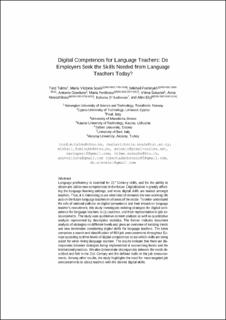| dc.contributor.author | Talmo, Tord Mjøsund | |
| dc.contributor.author | Soule, Maria Victoria | |
| dc.contributor.author | Fominykh, Mikhail | |
| dc.contributor.author | Giordano, Antonio | |
| dc.contributor.author | Perifanou, Maria | |
| dc.contributor.author | Suckacke, Vilma | |
| dc.contributor.author | Novozhilova, Anna | |
| dc.contributor.author | D'Ambrosio, Roberta | |
| dc.contributor.author | Elçi, Alev | |
| dc.date.accessioned | 2021-02-25T11:52:59Z | |
| dc.date.available | 2021-02-25T11:52:59Z | |
| dc.date.created | 2020-09-07T14:57:36Z | |
| dc.date.issued | 2020 | |
| dc.identifier.citation | Lecture Notes in Computer Science (LNCS). 2020, 399-413. | en_US |
| dc.identifier.issn | 0302-9743 | |
| dc.identifier.uri | https://hdl.handle.net/11250/2730388 | |
| dc.description.abstract | Language proficiency is essential for 21st Century skills, and for the ability to obtain and utilize new competencies in the future. Digitalization is greatly affecting the language learning settings, and more digital skills are needed amongst teachers. Thus, it is interesting to see what kind of demands the new working life puts on the future language teachers in all areas of the sector. To better understand the role of national policies on digital competence and their impact on language teacher’s recruitment, this study investigates existing strategies for digital competence for language teachers in 11 countries, and their representation in job announcements. The study uses qualitative content analysis as well as quantitative analysis represented by descriptive statistics. The former includes document analysis of strategies on different levels and gives an overview of existing trends and new tendencies considering digital skills for language teachers. The latter comprises a search and classification of 854 job announcements throughout Europe according to three levels of digital competences to see which skills are being asked for when hiring language teachers. The results indicate that there are discrepancies between strategies being implemented at overarching levels and the institutional practices. We also demonstrate discrepancies between the needs described for the 21st Century and the defined skills in the job announcements. Among other results, the study highlights the need for more targeted job announcements to attract teachers with the desired digital skills. | en_US |
| dc.language.iso | eng | en_US |
| dc.publisher | Springer | en_US |
| dc.title | Digital Competences for Language Teachers: Do Employers Seek the Skills Needed from Language Teachers Today? | en_US |
| dc.type | Peer reviewed | en_US |
| dc.type | Journal article | en_US |
| dc.description.version | acceptedVersion | en_US |
| dc.source.pagenumber | 399-413 | en_US |
| dc.source.journal | Lecture Notes in Computer Science (LNCS) | en_US |
| dc.identifier.doi | 10.1007/978-3-030-50513-4_30 | |
| dc.identifier.cristin | 1827858 | |
| cristin.ispublished | true | |
| cristin.fulltext | preprint | |
| cristin.qualitycode | 1 | |
